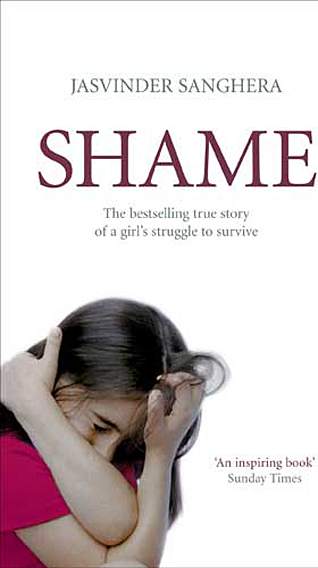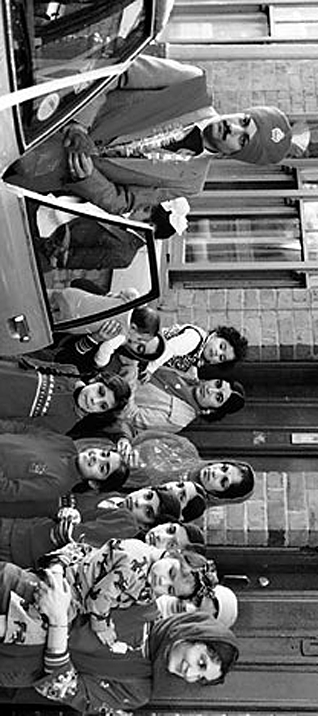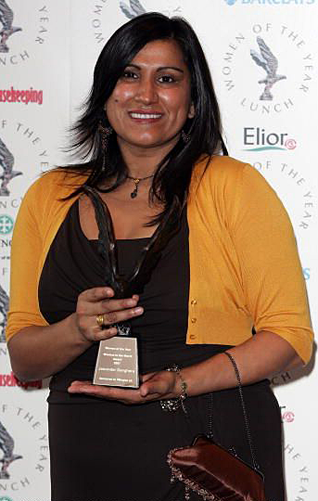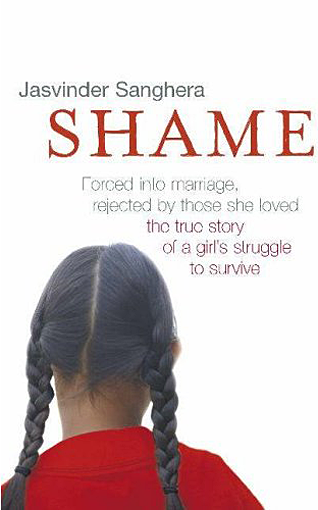
Below, second image from bottom - Author Jasvinder Kaur Sanghera, with her "Woman of the Year" Award.



Books
Shame
A Book Review by MANJYOT KAUR
SHAME, by Jasvinder Kaur Sanghera. Hodder & Stoughton Ltd, London, 2007. IBSN 978-0-340-92462-4. 289 pages. Price: 6.99 pounds.
Based in the South Asian immigrant enclaves of contemporary urban England, Shame is the heartrending autobiography of a young woman's attempt to escape from a world where family honor matters more than anything - sometimes even more than life itself.
Intelligent and lively, Jasvinder (known as Jas) grows up as the child of parents who immigrated to Derby in the 1950s from rural Punjab. As a girl, she observes each of her five sisters being married off in turn to men they have never met. ("A picture appeared, a trunk got filled, she went away to India for a while then came home married.")
Their husbands turn out to be physically and psychologically abusive; the young women plead to be allowed to return to the family home, but to no avail. Their parents believe this would cause unpardonable dishonor to the family in the eyes of Derby's Sikh community, especially at the gurdwara, which Jas describes as not a sacred place of worship but as "the local gossip shop."
It must be noted that, in a classic case of double standards, the only son of the family is allowed to freely date whoever catches his passing fancy, even white girls, who Jas' parents stereotype as being totally devoid of even the merest shred of morality.
When a photo of Jas' intended match suddenly appears on the mantlepiece, and her mother starts buying wedding clothes for an arranged marriage to this virtual stranger, Jas is faced with a terrible dilemma.
She has a secret boyfriend, Jassey.
Her parents, totally contrary to Sikh tenets, are rabidly caste-conscious and Jassey would be unacceptable to them. Although he has trained as an engineer and has a decently-paying job, he is not a fellow "jat", but a member of a so-called "lower caste" - both being most un-Sikh designations.
If she finds the courage to run away with Jassey, she will forfeit all ties with her family and become an instant pariah; as far as her parents and siblings are concerned, she will be irrevocably considered dead.
If she stays, she fears she runs the risk of being entrapped forever, like her sisters have been, in a marriage that amounts to little more than unending domestic drudgery and culturally-sanctioned physical and emotional abuse.
According to the author, this is the dilemma that scores of South Asian girls and young women living in Britain still face today.
It doesn't take the reader long to find out which of the above choices Jas made.
Just days before her wedding, she divulges Jassey's existence to her parents and refuses to marry the man they have chosen for her. As a result, she is locked in her room for three days. Pretending to relent and assent to the arranged marriage, she escapes from the house and flees Derby with Jassey, choosing Newcastle at random from a map in his car.
During their year in Newcastle, the young couple can only afford a squalid flat, Jassey cannot find work in his field and they both must lie low to avoid the "Asian grapevine." They then move to Leeds, where they live for another year, both working as vendors selling cheap goods in a market stall. Unending hours of hard work, especially by the indefatigable Jassey, gradually begin to pay off and they relocate again, this time to Bradford.
During this period, Jas attempts to get in touch with her family by phone and in writing. While Jassey's parents have become accepting of their son's situation, her letters go unanswered and the telephone line clicks dead before she has a chance to say more than a few words to her Mum or Dad. ("As far as they were concerned I was an outcast and outcasts belong in the gutter. The thought that I could survive - let alone thrive - outside the protective, prohibitive scaffolding that had encased her and Dad all their lives was anathema to them. I should have understood that.")
Then the seemingly inevitable happens: Jas becomes pregnant and decides to finally accept one of Jassey's frequent proposals of marriage. She believes that having a successful husband, a baby and a nice house might make her family reconcile themselves to her situation. Things do brighten a bit, as she manages to reestablish contact with two of her sisters, Robina and Lucy.
The couple marry and a daughter, Lisa, is soon born. But Jas' hopes of regaining her mother's love are dashed before she even leaves the maternity ward. ("Mum glanced into the bassinette for as long as it took to ascertain there was a baby in there. Me she acknowledged with the curt nod she might give a little-known acquaintance in the gurdwara.")
Although Jassey certainly seems like the model husband and father, Jas cheats on him with a man she meets while at a disco with Lucy. Surjit soon reveals himself as a violent control freak. When he breaks her nose with a vicious punch, Jas confesses everything to Jassey and begs for his help in ending the affair.
Hoping for a fresh start, Jas and Jassey move back to Derby. A long-awaited phone call from Jas' mother arrives, but it is only to relay atrocious news: Robina, trapped for years in an horrendously abusive marriage, has committed suicide by self-immolation with paraffin. Jas is not allowed to enter her parent's home or participate in the family's mourning.
Jas' half-hearted attempts to hold her marriage together for Lisa's sake soon fizzle out when she meets Rajvinder and, in short order, starts another affair and moves in with him.
"Ten years before, he'd rescued me and now, in return, I'd left him weeping," Jas matter-of-factly says of Jassey, evidently quite unhesitant to display herself to the reader "warts" and all. After a divorce from Jassey, she and Rajvinder marry. (Although she will have two children with Raj, Jas' second marriage will also eventually end in divorce. Unlike Jassey, Jas is not of a forgiving nature when she discovers Raj has been having an affair.)
A long yearned-for reconciliation with her mother occurs, but only under tragic circumstances: when her mother enters a hospice after being diagnosed with inoperable cancer. ("Now she knew she was dying, she let her guard down. When I went there, it was just her and me, and I could sit there, holding her hand.")
Although Jas joins the family at the deathbed, after her mother passes away, her father and siblings refuse to speak to her.
She is haunted by the last weeks of the life of her mother, who did not speak any English, could not communicate with her caregivers and refused to eat the hospice's unfamiliar non-Indian food. She also feels tormented by the horrific way Robina died and the fact that not only her parents, but also community leaders, turned a deaf ear to her sister's repeated pleas for help.
Fervently wanting to "do something to change the world that had failed my family," a stop-in at the local women's center one day on her way home sparks her enthusiasm. She soon becomes a volunteer at its pregnancy testing unit and then at a rape crisis center. As she offers the women counsel and support, and shares the story of her own family dysfunctions with them, her dream of helping women of South Asian origin facing cultural and language barriers begins to take shape.
She names her new project Karma Nirvana to symbolize peace of mind and enlightenment. Speaking at meeting after meeting to secure housing and funding for her nascent organization, she finds a tremendous sense of liberation and empowerment in talking publicly about her mother, who had been "hurt and humiliated because those paid to care for her didn't understand her needs," her sister, whose "awful suffering and agonizing death had happened because she didn't know where to turn for help," and her own escape from a forced marriage and resulting ostracism from her family and community.
Besides the impact this empowerment has on the myriad of British-Asian women affected by domestic violence and honor-based crimes that Jas serves through Karma Nirvana, allowing them to seek and receive the help they so desperately need without rejecting their cultural identity, it also spurs her to realize another dream: resuming her formal education.
She not only completes her "A levels," but goes on to take a degree from Derby University and begin post-graduate work on honor-based violence.
Her academic research also sparks her dormant interest in Sikhi. In the course of her reading for a dissertation on Sikh women who had been disowned by their families, she begins to explore the Sikh scriptures (which she inexplicably refers to as if it were a person).
"Guru Granth Sahib believed in equality between men and women and was against forced marriage as well as the caste system. Mum had always used his teachings as a weapon but I learnt they couldn't have been more different from what she taught me."
The last chapters of Shame are filled with stories of triumph over adversity from some of the women Karma Nirvana has served.
Like Jas herself, they have refused to let their personal histories of pain and abuse turn them into silent, powerless victims. Instead, they are playing a highly proactive role in healing their minds and bodies and rebuilding their lives as proud British-Asian women and integral members of their communities.
This chronicle of an arduous journey to self-knowledge is undoubtedly a harrowing read.
It is an unsparingly honest one, too.
Sanghera gives quite a frank account of herself, even when her own actions (especially towards the loving and devoted Jassey) could be easily viewed in a very unsympathetic way.
Shame is not a literary work and does not always flow smoothly in structure and phrasing. A bit repetitive in parts, it also goes into too much detail on some aspects of Sanghera's life the reader really does not need to know so much about.
On the other hand, overly zealous editing might have risked robbing the book of its compelling sense of immediacy and authenticity.
Despite the searing pain and loss it portrays, this book does not leave the reader in a frustrated or depressed frame of mind. Rather, the dogged persistence with which Sanghera rebuilds her own life and assists other abused women to do so imbues this triumphant story with an uplifting feeling of optimism and inspiration that conveys itself quite convincingly to its audience.
A real eye-opener on a generally taboo subject, Shame is well worth the read.
October 29, 2008
Conversation about this article
1: Harpreet Singh (London, England), October 29, 2008, 8:12 PM.
Every Sikh should read this book to understand the horrific oppression some women suffer in their families. Jasvinder is an authentic hero and role model, she is a survivor of the most horrible circumstances and backward cultural pressures. Thanks for the review. This book should be handed out as literature at gurdwaras to raise consciousness of this problem.
2: Suzy Kaur (Oxford, England), October 31, 2008, 8:29 AM.
I am a little dissapointed with the lack of comment on this thread. It seems that when a positive story about someone wearing a turban is on the news, or a businessman making a notable success, we cannot stop ourselves celebrating. When a woman appears who escaped from the most horrific violence and coercion appears, who dedicates her life to helping others in a similar situation, we all go silent. Why? Why are people not expressing support for Jaswinder Sanghera and her efforts to help Sikh and South Asian women and men who suffer violence and oppression in the diaspora? Isn't this a great example of a brave and fearless Sikh woman?
3: Geeta (New Haven, U.S.A.), October 31, 2008, 6:45 PM.
Hi Manjyot - a really nice review. Thanks. Have you also seen the book by Satnam Sanghera? - also London based. Well worth a read.
4: Gurmeet Kaur (Atlanta, Georgia, U.S.A.), November 03, 2008, 2:53 PM.
Manjyot's review is so compelling. I just ordered my copy of "Shame". Finally, somebody had the courage to write about a story that is so often heard in bits and pieces and dismissed so easily. I have been hearing about honor killings since I was a child. I have heard of parents abandoning their girls if they married outside the religion or race; which I find ridiculous. Nobody ever abandoned their son if he married a non-jat or a white woman. Disrespecting women at every step (sometimes even before she is born - female infanticide and all), we then as a nation wonder, why are we losing our women?
5: I.J. Singh (New York, U.S.A.), November 03, 2008, 7:25 PM.
Isn't it a shame that in no gurdwara that I know has there ever been a presentation and discussion of such matters? Whatever they are, gurdwaras are our "community centers" and hence the arbiters of our social ethics. I am glad the book is published, and I am glad that Manjyot has provided a superb review of it. Now we have to walk the talk. How do we raise awareness of such matters is the question and how do we foster action?
6: Suzy Kaur (Oxford, England), November 04, 2008, 1:42 PM.
Gurmeet Kaur makes a pertinent point. These issues really do revolve around that atavistic evil called the caste system.
7: Amardeep (U.S.A.), November 04, 2008, 6:10 PM.
To begin with, we can post the 'domestic violence helpline' 1-800 numbers in all gurdwaras, especially in the women's restrooms. Even if it helps one person/year, it is a n-win situation.
8: Suzy Kaur (Oxford, England), November 04, 2008, 8:28 PM.
Amardeep, Jaswinder Sanghera has talked in interviews about how she was not allowed to put posters for her refuge on the notice board of gurdwaras in her home town. People are in total denial.
9: Gurmeet Kaur (Atlanta, Georgia, U.S.A.), November 05, 2008, 10:50 AM.
Dr. I. J. Singh ji, you are absolutely correct. Gurdwaras are run by old timers and they are interested only in retaining the status quo. On the 300th Guru Gaddi Divas celebration, our gurdwara is organizing a seminar and I too was invited to speak. I insisted on speaking on the message of Guru Sahib pertaining to 'Gender Equality'. Initially, the question arose: What has it got to do with 300th anniversary celebration? Everything, I replied. Until we fail to recognize that the walls of our house are crumbling as one of the pillars is breaking down, how can we even stand in equilibrium, let alone celebrate? Secondly, what is a better way to celebrate the Great Guru, than to understand and comprehend the message. We talk about Unversality of Guru Sahib's message; why exclude its unique message on the upliftment of 50% of the humanity? They did give in. Things are changing; but like President-Elect Obama says: change has to come from bottom up. Women have to liberate themselves of every subjugation. Educate themselves and do the right thing. Guru Granth empowers us. We just need to understand and appreciate it.
10: Harpreet Singh Randhawa (Fremont, California, U.S.A.), November 05, 2008, 5:05 PM.
I for one have always been against arranged marriage and the hypocrisy which some Sikh parents practice of caste-based marriages while reminding the kids of equality within Sikhism.
11: Gurmeet Kaur (Atlanta, Georgia, U.S.A.), December 01, 2008, 6:53 PM.
I just finished reading "Shame" and my first reaction is the same as Suzy Kaur's (Comment #2). 'Honor Based Crimes' in our community far outnumber 'Hate Based Crimes' committed on our community and yet there is so little discussion, such little effort and such indifference to the issue. I applaud Jasvinder Kaur's courage and work. I only wish she was more educated about Sikhi and her writing would not leave the readers with a sense of backwardness of the Sikh religion. I do not blame her, though. It is only the result of cruelities inflicted by her family and the Sikh community that paints such a bad picture about us. I thank sikhchic.com and Manjyot for the review. I wish for each one of us to read this book. I wish Jasvinder peace and strength to continue her work. I wish for more women to come and tell their stories and empower themselves like Jasvinder did.
12: Carolyn (St.. John, Canada), February 02, 2010, 2:14 PM.
I heard someone on a talk show, a marriage "expert", talking about arranged marriage as a good thing because it does not end in divorce as much as marriages for "love." Is this because the woman in an arranged marriage would be killed if she tried to leave the marriage. [Editor: No, there is no prohibition or barriers against divorces in "arranged marriages". Sadly, the instance of divorce has increased in "arranged marriages" as well. It looks like neither system is necessarily better - it all depends on the individuals.]


